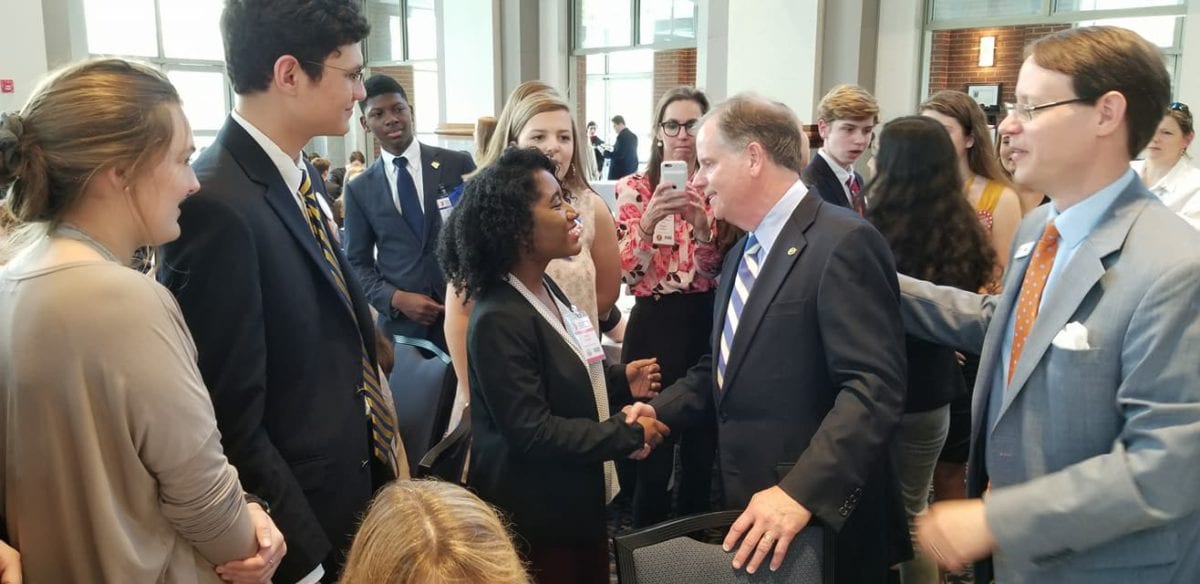
U.S. Senator Doug Jones meets with Alabama’s 70th Annual YMCA Youth Legislature.
By Glynn Wilson —
WASHINGTON, D.C. — Squeezing information out of the federal government has long been a problem for journalists, researchers, lawyers and the American public. But it has become even harder under the Trump administration, where factual information and real journalism don’t seem to matter to those in charge of the executive branch agencies.
For 52 years, the Freedom of Information Act, passed by Congress in the 1960s and signed into law by President Lyndon Johnson in 1967, has been the mechanism used to obtain federal records. But the law does not even apply to Congress.
And agencies such as the Environmental Protection Agency under Scott Pruitt, who resigned last week, have stonewalled, delayed and even blatantly refused to comply with the law on a number of fronts.
The problem became so severe in recent months that Maryland Congressman Elijah E. Cummings, a Democrat and Ranking Member of the powerful House Committee on Government Oversight and Reform, sent a long, detailed letter to the EPA demanding an explanation and compliance. The Society of Environmental Journalists, a professional organization I helped found in 1990, has also weighed in.
“On behalf of its 1,400 members, other journalists and the public at large, the Society of Environmental Journalists calls on you (EPA) to end this assault on government transparency now,” the group says in a letter. “We are joined by other journalism organizations: the Reporters Committee for Freedom of the Press, the Society of Professional Journalists, and the Radio Television Digital News Association.”
Now that Pruitt is out and his deputy administer and now acting director Andrew Wheeler is in, it is anyone’s guess whether information will begin to flow more freely.
Meanwhile, in part due to problems with FOIA and his keen interest in civil rights cases, U.S. Senator Doug Jones of Alabama has introduced legislation mandating the review, declassification, and release of government records related to unsolved criminal civil rights cases.
In a press conference call on Thursday, Senator Jones confirmed that he believes it will be easier to make progress on this specific type of information rather than trying to reform and make changes to FOIA or to try to get Congress to apply the “cumbersome” law to its own members.
These old records predate the internet, email and digital computer storage and in some cases are up to 50 years old, he said, mostly at the Department of Justice with the FBI. They remain classified “unnecessarily,” he indicated, and in many cases involve old FBI investigative files, summaries of interviews they were doing at that time and such, which are shielded from public view for no good reason now.
“There are some limitations to these cases that will make it a lot easier to gather the records from,” he said in response to my question about this.
According to a press release announcing the proposed law, Jones indicated that specific legislation is necessary “because the Freedom of Information Act (FOIA), as implemented, has prevented the timely and adequate disclosure of executive branch records, and congressional records are not subject to public disclosure under FOIA.”
The Civil Rights Cold Case Records Collection Act of 2018, already cosponsored by U.S. Senator Claire McCaskill, a Democrat from Missouri, along with a companion bill now in the House, could get past this problem by requiring the National Archives and Records Administration to create a collection of government documents related to civil rights cold cases and to make those documents available to the public.
“Having prosecuted two civil rights cold cases in Alabama, I know first-hand the importance of having every available piece of information at your disposal,” Senator Jones, a former U.S. Attorney, said. “This bill will ensure public access to records relating to these cases and will expand the universe of people who can help investigate these crimes, including journalists, historians, private investigators, local law enforcement and others.”
As a U.S. Attorney in Birmingham, Mr. Jones successfully prosecuted two of the former KKK members responsible for the bombing of the 16th Street Baptist Church. That experience in part made him into an advocate for greater access to civil rights cold case records.
In that case, he said in the conference call, there was a specific case file investigators and prosecutors were able to use to build a foundation for the old case. When asked, he said he has not yet talked to Attorney General and former Senator Jeff Sessions about it, but he indicated Sessions has in the past been sympathetic.
After winning that old case, Jones later testified in 2007 before the House Judiciary Committee in support of the Emmett Till Unsolved Civil Rights Crimes Act that established a special initiative in the U.S. Department of Justice to investigate civil rights cold cases, speaking about the difficulty of prosecuting crimes so many years after they were committed. He pointed then to the importance of sharing information in order to find the truth.
“We might not solve every one of these cold cases, but my hope is that this legislation will help us find some long-overdue healing and understanding of the truth in the more than 100 unsolved civil rights criminal cases that exist today,” Jones said.
Speaking in support of the bill, Senator McCaskill, a former prosecutor, issued a statement.
“We’ve made progress ensuring these heinous acts of violence and hatred are able to be brought to justice — but we have more work to do,” she said. “Helping families and advocates get access to these documents could help their push towards justice for these long unsolved cold cases.”
A number of historians and academic researchers around the country have been digging into some of these cases, which of course tend to be concentrated in the South, Senator Jones said, especially in Alabama and Mississippi. One historian is Hank Klibanoff, who is originally from Alabama but is now the director of the Georgia Civil Rights Cold Cases Project at Emory University in Atlanta.
“It is hard to overstate the positive impact that Senator Jones’s proposed Civil Rights Cold Case Records Collection Act would have on thousands of families who, 40 to 60 years later, have no idea how a father, grandfather, aunt or brother came to a violent death in the modern civil rights era,” Klibanoff said. “As a journalist and historian who relies on government-held records in these civil rights cold cases, it’s important to know that our purposes are simple: To learn the truth, to seek justice where there may be a living perpetrator, to tell the untold stories, and to bring closure to families of victims, and find opportunities for racial reconciliation.”
If it could generate enough interest in Congress and make it onto the calendar for a vote, the law would require the National Archives and Records Administration (NARA) to establish a collection of cold case records about unsolved criminal civil rights cases that government offices must publicly disclose in the collection without redaction or withholding. It would also establish a Civil Rights Cold Case Records Review Board as an independent agency of impartial private citizens to facilitate the review, transmission to NARA, and public disclosure of government records related to such cases.
Senator Jones’ indicated his bill was modeled after the Assassination Records Collection Act of 1992, written by President John F. Kennedy, Jr., which created an orderly and effective process for reviewing, declassifying, and releasing thousands of documents related to the assassination of President John F. Kennedy in 1963.
The legislation proposed by Senator Jones was originally envisioned by students from Hightstown High School in Hightstown, New Jersey, and their teacher, Stuart Wexler, he said.
Read more about the legislation here.
Watch Senator Jones speak about the bill on the Senate floor here.
Other Issues
Addressing other issues in the weekly conference call on Thursday, Senator Doug Jones indicated he was not ready to make a decision on how he will vote on President Donald Trump’s nominee for the Supreme Court, U.S. appeals court judge Brett Kavanaugh from Washington, who if confirmed, would replace long-serving swing Justice Anthony Kennedy. He announced his retirement on June 27 at age 81.
Mr. Jones said he would dig deep into the records and decisions of Kavanaugh and make an “independent judgement,” probably after the Judiciary Committee hearings and vote that could come in the fall before the midterm elections. Jones said he would not “rubber-stamp” the president’s appointment or come out strongly against the nominee as many other Democrats in Congress and around the country have done already.













